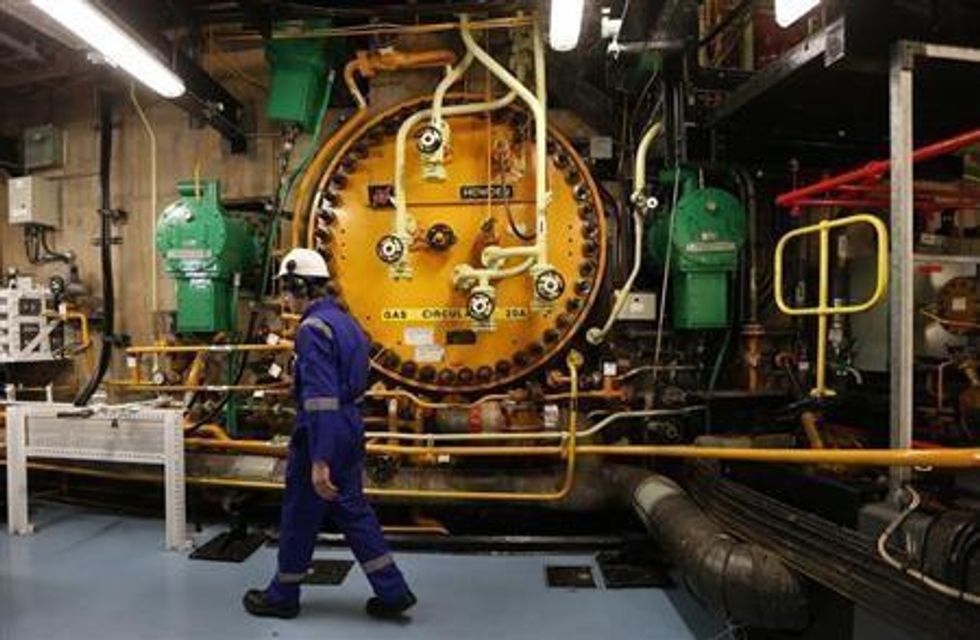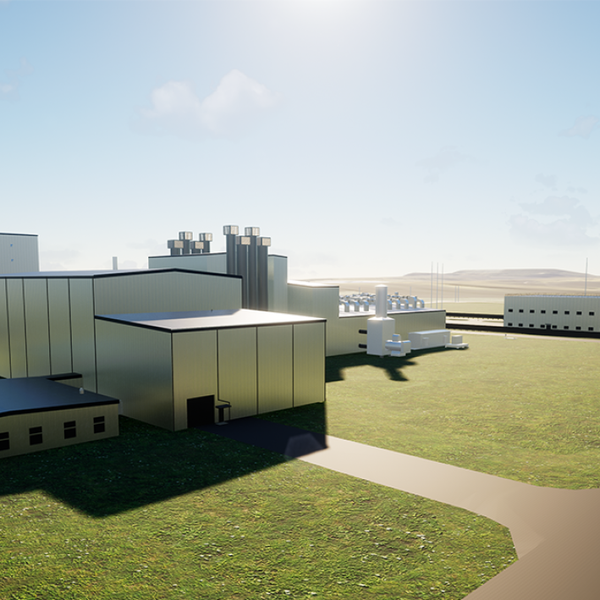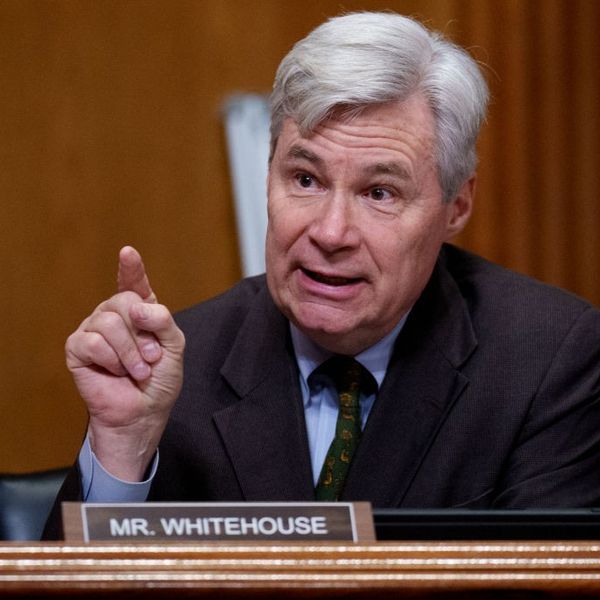'Dirty, Destructive, Damaging': Critics Slam UK Approval of First New Nuclear Plant in a Generation
Critics say government embrace of nuclear is danger to people and the environment

"This is an extraordinary effort to keep nuclear in the mix," said Damon Moglen, spokesperson for Friends of the Earth, in an interview with Common Dreams. "The British government is acting out of a 20th century mentality, not a 21st century mentality."
The British government and the French state-controlled EDF group announced Monday that they are moving forward with plans to build a new plant--Hinkley Point C plant--next to existing plants in southwest England. Two Chinese companies, China General Nuclear Corporation and China National Nuclear Corporation, will also be major investors with 30-40 percent stakes.
At a price tag of PS16 billion, or $26 billion, energy consumers and British taxpayers will bear most of the cost of the government's long-term commitment to the nuclear plant, which is not slated for completion until 2023. As part of the deal, the UK government is guaranteeing a price of up to PS92.50, or $150, per megawatt-hour, which is over two times the current market rate.
"The British nuclear industry has been dirty, destructive, polluting, and damaging to the environment and public health for decades in Britain," Moglen said. "The idea that we are going to turn a corner on that history by outsourcing the industry and asking the rate payer to pay twice as much for nuclear power is laughable."
British Prime Minister David Cameron declared that the deal signals a "kick-start" to the British nuclear industry, stating, "This is a very big day for our country: the first time we've built a new nuclear power station for a very long time."
Yet, critics say it spells out a dark future for a generation of consumers.
"It will lock a generation of consumers into higher energy bills, via a strike price that's nearly double the current price of electricity, and it will distort energy policy by displacing newer, cleaner, technologies that are dropping dramatically in price," declared Greenpeace UK Executive Director John Sauven in a statement emailed to Common Dreams. He cited wind and solar power as more efficient and environmentally-friendly alternatives.
Critics charge that industry influence in government is keeping nuclear alive against the best interests of the British people and environment.
"The nuclear industry has captured the government," writes Damian Carrington in the Guardian. "Don't forget that just 48 hours after the Fukushima catastrophe, government officials were working with the industry to play down the terrible events - before they had even unfolded."
Critics also warn there is no viable plan in place to deal with nuclear waste. "Britain is completely in a dither about trying to deal with its nuclear waste problem," Moglen told Common Dreams. "The idea that when you have no idea how to address nuclear waste you are going to build more plants and expect the public to pay even more money is ridiculous."
Moglen said he is confident that the people of Britain will not take this development lying down. "There is a history and tradition of environmental protest in Britain," he said."I think this will be greeted with strong and long-term opposition."
_____________________
An Urgent Message From Our Co-Founder
Dear Common Dreams reader, The U.S. is on a fast track to authoritarianism like nothing I've ever seen. Meanwhile, corporate news outlets are utterly capitulating to Trump, twisting their coverage to avoid drawing his ire while lining up to stuff cash in his pockets. That's why I believe that Common Dreams is doing the best and most consequential reporting that we've ever done. Our small but mighty team is a progressive reporting powerhouse, covering the news every day that the corporate media never will. Our mission has always been simple: To inform. To inspire. And to ignite change for the common good. Now here's the key piece that I want all our readers to understand: None of this would be possible without your financial support. That's not just some fundraising cliche. It's the absolute and literal truth. We don't accept corporate advertising and never will. We don't have a paywall because we don't think people should be blocked from critical news based on their ability to pay. Everything we do is funded by the donations of readers like you. Will you donate now to help power the nonprofit, independent reporting of Common Dreams? Thank you for being a vital member of our community. Together, we can keep independent journalism alive when it’s needed most. - Craig Brown, Co-founder |

"This is an extraordinary effort to keep nuclear in the mix," said Damon Moglen, spokesperson for Friends of the Earth, in an interview with Common Dreams. "The British government is acting out of a 20th century mentality, not a 21st century mentality."
The British government and the French state-controlled EDF group announced Monday that they are moving forward with plans to build a new plant--Hinkley Point C plant--next to existing plants in southwest England. Two Chinese companies, China General Nuclear Corporation and China National Nuclear Corporation, will also be major investors with 30-40 percent stakes.
At a price tag of PS16 billion, or $26 billion, energy consumers and British taxpayers will bear most of the cost of the government's long-term commitment to the nuclear plant, which is not slated for completion until 2023. As part of the deal, the UK government is guaranteeing a price of up to PS92.50, or $150, per megawatt-hour, which is over two times the current market rate.
"The British nuclear industry has been dirty, destructive, polluting, and damaging to the environment and public health for decades in Britain," Moglen said. "The idea that we are going to turn a corner on that history by outsourcing the industry and asking the rate payer to pay twice as much for nuclear power is laughable."
British Prime Minister David Cameron declared that the deal signals a "kick-start" to the British nuclear industry, stating, "This is a very big day for our country: the first time we've built a new nuclear power station for a very long time."
Yet, critics say it spells out a dark future for a generation of consumers.
"It will lock a generation of consumers into higher energy bills, via a strike price that's nearly double the current price of electricity, and it will distort energy policy by displacing newer, cleaner, technologies that are dropping dramatically in price," declared Greenpeace UK Executive Director John Sauven in a statement emailed to Common Dreams. He cited wind and solar power as more efficient and environmentally-friendly alternatives.
Critics charge that industry influence in government is keeping nuclear alive against the best interests of the British people and environment.
"The nuclear industry has captured the government," writes Damian Carrington in the Guardian. "Don't forget that just 48 hours after the Fukushima catastrophe, government officials were working with the industry to play down the terrible events - before they had even unfolded."
Critics also warn there is no viable plan in place to deal with nuclear waste. "Britain is completely in a dither about trying to deal with its nuclear waste problem," Moglen told Common Dreams. "The idea that when you have no idea how to address nuclear waste you are going to build more plants and expect the public to pay even more money is ridiculous."
Moglen said he is confident that the people of Britain will not take this development lying down. "There is a history and tradition of environmental protest in Britain," he said."I think this will be greeted with strong and long-term opposition."
_____________________

"This is an extraordinary effort to keep nuclear in the mix," said Damon Moglen, spokesperson for Friends of the Earth, in an interview with Common Dreams. "The British government is acting out of a 20th century mentality, not a 21st century mentality."
The British government and the French state-controlled EDF group announced Monday that they are moving forward with plans to build a new plant--Hinkley Point C plant--next to existing plants in southwest England. Two Chinese companies, China General Nuclear Corporation and China National Nuclear Corporation, will also be major investors with 30-40 percent stakes.
At a price tag of PS16 billion, or $26 billion, energy consumers and British taxpayers will bear most of the cost of the government's long-term commitment to the nuclear plant, which is not slated for completion until 2023. As part of the deal, the UK government is guaranteeing a price of up to PS92.50, or $150, per megawatt-hour, which is over two times the current market rate.
"The British nuclear industry has been dirty, destructive, polluting, and damaging to the environment and public health for decades in Britain," Moglen said. "The idea that we are going to turn a corner on that history by outsourcing the industry and asking the rate payer to pay twice as much for nuclear power is laughable."
British Prime Minister David Cameron declared that the deal signals a "kick-start" to the British nuclear industry, stating, "This is a very big day for our country: the first time we've built a new nuclear power station for a very long time."
Yet, critics say it spells out a dark future for a generation of consumers.
"It will lock a generation of consumers into higher energy bills, via a strike price that's nearly double the current price of electricity, and it will distort energy policy by displacing newer, cleaner, technologies that are dropping dramatically in price," declared Greenpeace UK Executive Director John Sauven in a statement emailed to Common Dreams. He cited wind and solar power as more efficient and environmentally-friendly alternatives.
Critics charge that industry influence in government is keeping nuclear alive against the best interests of the British people and environment.
"The nuclear industry has captured the government," writes Damian Carrington in the Guardian. "Don't forget that just 48 hours after the Fukushima catastrophe, government officials were working with the industry to play down the terrible events - before they had even unfolded."
Critics also warn there is no viable plan in place to deal with nuclear waste. "Britain is completely in a dither about trying to deal with its nuclear waste problem," Moglen told Common Dreams. "The idea that when you have no idea how to address nuclear waste you are going to build more plants and expect the public to pay even more money is ridiculous."
Moglen said he is confident that the people of Britain will not take this development lying down. "There is a history and tradition of environmental protest in Britain," he said."I think this will be greeted with strong and long-term opposition."
_____________________

